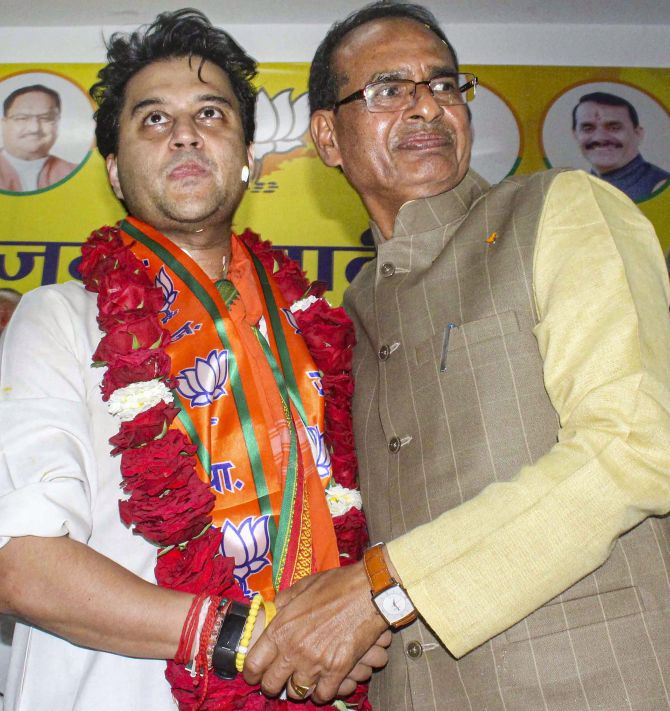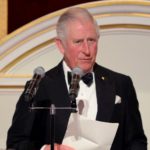People close to the erstwhile royal family underline that Jyotiraditya Scindia is neither as accessible nor as unpretentious as his father.
Sandeep Kumar reports.
In June 2018, the people of Guna saw with interest a new face at Congress meetings: Mahanaryaman Scindia, son of Jyotiraditya Scindia who was then the Congress campaign committee in charge.
Whether it was Guna, Gwalior or Shivpuri districts, Mahanaryaman assisted his father by travelling to places the latter was not able to visit.
On Tuesday, March 10, when Scindia Sr parted ways with the Congress, his son tweeted: ‘I am proud of my father for taking a stand for himself. It takes courage to resign from a legacy.’
History repeats itself
It was in 1967 that Jyotiraditya’s grandmother, Vijaya Raje Scindia, parted ways with the Congress and toppled the then Dwarka Prasad Mishra-led Congress government.
Rajmata, as Vijaya Raje was known, had lured away 36 MLAs from the Congress after tensions with Mishra came to a head.
Now, after 53 years, Jyotiraditya has done the same.
But will the Bharatiya Janata Party greet his entry with the same kind of warmth it extended to Vijaya Raje five decades ago? Highly unlikely.
The lines from a famous Hindi poem on Laxmibai, the queen of Jhansi, suggesting the Scindias were a ‘friend’ of the British — Angrezon ke mitra Scindia ne chhodi rajdhani thi (Friends of the British, the Scindias had abandoned the capital) — is part of a legacy that still haunts the family.
The poem was written by Subhadra Kumari Chauhan (1904-1948), herself a freedom fighter, and was a rallying cry for youths to join the freedom movement.
In August 2017, in a direct attack on Jyotiraditya, the BJP’s Shivraj Singh Chouhan, who was then the chief minister of Madhya Pradesh, read out the poem publicly.
Presumably Yashodhara and Vasundhara, the two daughters of the Rajmata, escape castigation because they are married into other households/royal families!
In 2010, the BJP-ruled Gwalior municipal corporation wrote on its official Web site that the Scindia family had conspired against Laxmibai and provided her a weak horse.
It was the time when Yashodhara Raje was the member of Parliament from Gwalior.
But Shivpuri-based historian Pramod Bhargav rejects the claim and says that the Scindias never had any ties with Laxmibai or with other leading lights of the revolt of 1857.
However, the Scindias’s proximity to the British has haunted the family for decades.
In August 2006, Jyotiraditya’s aunt and then Rajasthan chief minister, Vasundhara Raje, had faced angry protests in Indore when she was invited to unveil the bust of Laxmbai.
Vasundhara, however, dismissed the charge and claimed that ‘as a woman’ she had the highest regard for Laxmibai and considered her a role model.
The Scindias’s proximity to the British had earned them many rewards.
In the Imperial Durbar in Delhi in 1877, Jayajirao Scindia, the maharaja of Gwalior from 1843 to 1886, received the rank of a general and a 21-gun salute.
Journalist Rakesh Dixit says, “Mocking Jyotiraditya Scindia for what his ancestors did is not correct. Most of the royal families of that period chose to be with the British. Their aim was to protect their interests first. We have to see the whole picture.”
Gandhi’s assassination and Gwalior
Although Vijaya Raje started her political career with the Congress, her husband Jivajirao Scindia was a patron of the Hindu Mahasabha in Gwalior.
Communist Party of India-Marxist leader Badal Saroj, who comes from Gwalior, says, “The gun used in Gandhi’s assassination was brought from Gwalior. It is shocking that how Nathuram Godse acquired the gun and where it came from was never thoroughly investigated.”
“Although no direct link between Jivajirao and Godse was found, it is true that people close to the mahal (palace) provided the gun. All the accused, including gun-seller Jagdish Goyal and the man who purchased it, Dr D S Purchure, were close to the royal family,” alleges Saroj.
On March 11, Congress leader Digvijaya Singh tweeted: ‘Also the revolver by which Godse killed Mahatma Gandhi was given to him by one Parchure from Gwalior. Need to do some more research about who was Parchure.’
At one time, the Congress had a very weak presence in the region.
Jawaharlal Nehru, then the prime minister, convinced Vijaya Raje to join the party and contest from Guna.
She did and in the 1957 Lok Sabha election, defeated the Hindu Mahasabha candidate from the constituency.
Senior journalist Vijay Dutt Shridhar writes in his book Sheh Aur Maat — Madhya Pradesh ki Rajneeti ki Kahani (Check and Mate — The Story of the Politics of Madhya Pradesh): ‘In 1967, when Rajmata went to discuss elections and ticket distribution, then CM D P Mishra forced her to wait for 15-20 minutes. This didn’t go down well with Scindia.’
‘She took it as an insult and left the Congress with 36 legislators. Madhya Pradesh got its first government without the Congress when Govind Narayan Singh became chief minister. This government lasted for 20 months.’
The presence of the mahal was so strong that even during the Indira Gandhi wave in 1971, Vijaya Raje managed to win three Lok Sabha seats in the Gwalior region for the Jana Sangh which she had by then joined.
Her son, Jyotiraditya’s father Madhavrao, once recalled: ‘I was just 26. Amma maharaj told me to contest from Guna and I followed her instructions.’
Family feud and the role of Angre
Saroj, who contested against Madhavrao in the 1989 election, says: “Till the 1971 elections, Madhavrao was with Vijaya Raje. Later, disputes of property and Vijaya Raje’s closeness to Sardar Sambhajirao Angre made him drift away. He used to say: ‘These (Rashtriya Swayamsevak Sangh) people conspired with Angre and that is the main reason for differences with Amma maharaj’.”
Who was Angre? Vijaya Raje’s private secretary and confidant of four decades.
The Angre family served the Scindias for eight generations as commanders-in-chief.
In her autobiography, The last Maharani of Gwalior, Vijaya Raje wrote, ‘Sambhajirao came to my husband to offer his services in the spirit of the historical ties between our families. He became my husband’s most trusted confidant. I too soon began to call him by his nickname ‘Bal‘ while the children by instinct began calling him uncle.’
She further admits: ‘Madhavrao believed that it was Angre’s influence over me which gave my political beliefs their rigidity.’ But she had only praise for Angre, saying since her husband’s death, he had become indispensable.
She also admitted to a close affinity between their political beliefs and their common concerns for the Hindu faith.
A source close to the Scindia family says, “There was such bad blood that when Jyotiraditya got married, his grandmother was not even invited.”
The family bitterness later transformed into legal battles, which ran into crores of rupees and continued even after the deaths of both Vijaya Raje and Madhavrao Scindia.
Vijaya Raje had five children.
The eldest daughter, Padmavati Raje, married Kirit Deb Burman of the Tripura royal family.
The second daughter, Usha Raje, married Shamsher Jang Bahadur Rana from the royal family of Nepal.
And Vasundhara Raje and Yashodhara Raje are both BJP leaders.
Shridhar writes in Sheh Aur Maat: ‘Once an angry Vijaya Raje recalled how Queen Ahilyabai Holkar had ordered the killing of her only son by getting him trampled under the feet of an elephant for his activities. To this, Madhavrao had replied, “She is my mother and has every right to say so”.’
People close to the erstwhile royal family underline that the Harvard and Stanford-educated Jyotiraditya Scindia is neither as accessible nor as unpretentious as his father.
After his switch to the other side, will Gwalior still echo with the rallying cry that sustains monarchies all over the world, ‘Long live the King’?




